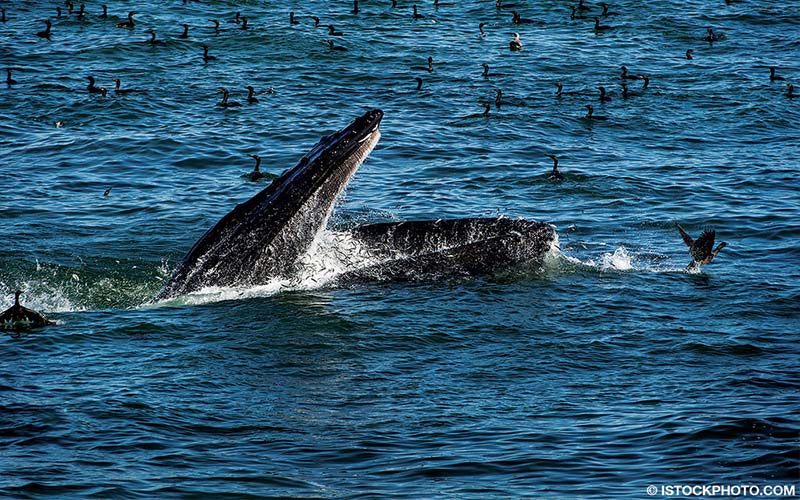Often called the most important fish in the sea, Atlantic menhaden are under attack — not by the marine predators that eat them, but by humans. Menhaden flesh, which is very oily, is used in a variety of products, including fertilizer, pet food, health food supplements and even lipstick and paint. Large fishing fleets scoop up menhaden in enormous nets, vacuuming up a public resource and turning it into huge profits. Local commercial fishermen also target these fish during their migrations nearer to shore, pulling in vast quantities of striped bass and bluefish, as well as menhaden, in their nets.
Menhaden, also known as bunker, are forage fish that play a critical role in the ocean food web. They are a vital source of food for wildlife up and down North America’s Atlantic seaboard. Birds, whales, dolphins, sharks, striped bass and bluefish depend on menhaden for a large portion of their diet. In addition to being prey for wildlife, menhaden are also filter feeders that help improve the water quality of our oceans.
In 2012 I worked on a highly successful campaign to reduce the number of menhaden caught. We are now seeing the results of that victory: The increased numbers of menhaden left in the ocean in the past five years have helped all the species that depend on them. Eagles have made a comeback on the north shore of Long Island, N.Y., whales are seen feeding in the New York/New Jersey Bight, and thresher sharks and bottlenose dolphins are becoming more abundant.
Scuba diving, recreational fishing and whale watching bring in big bucks, and these activities depend on menhaden’s predators. According to the National Oceanic and Atmospheric Administration (NOAA), approximately 167,000 jobs in these sectors generate more than $15 billion annually for the U.S. Atlantic states.
Despite this progress, menhaden are still managed using a narrow single-species approach that ignores their importance to the ocean food web. The Atlantic States Marine Fisheries Commission (ASMFC), the governing body that coordinates the conservation and management of menhaden, recently took the first step to change that. Under Amendment 3 of the Interstate Fishery Management Plan for Atlantic Menhaden, the commissioners will set a management precedent by establishing an ecological management approach for this fish. Using ecological reference points (ERPs), the new method will determine how many menhaden should be left in the water for all the other species that depend on them.
Managing menhaden based on its role in the ecosystem is a historic opportunity to set a national and even a global precedent in forage-fish conservation. We encourage all divers and ocean advocates to reach out to their state commissioners to let them know we care.

As an avid scuba diver with a special love for sharks, I know the importance of the ocean food web. Seeing whales, dolphins and sharks while diving is an amazing experience — one that I wish to continue having. But underwater encounters with these animals rely on the abundance of the animals’ prey.
A public comment period will be held in late August or early September, and the commission will hold a final vote Nov. 14, 2017. The more people who attend the public hearings — in each state along the East Coast, from Maine to Florida — and the final vote in Washington, D.C., the better the outcome should be. You can also write letters and send emails. To share your comments and find out how to attend a hearing or the final vote, visit the ASMFC website at ASMFC.org.
Explore More
© Alert Diver — Q3 2017